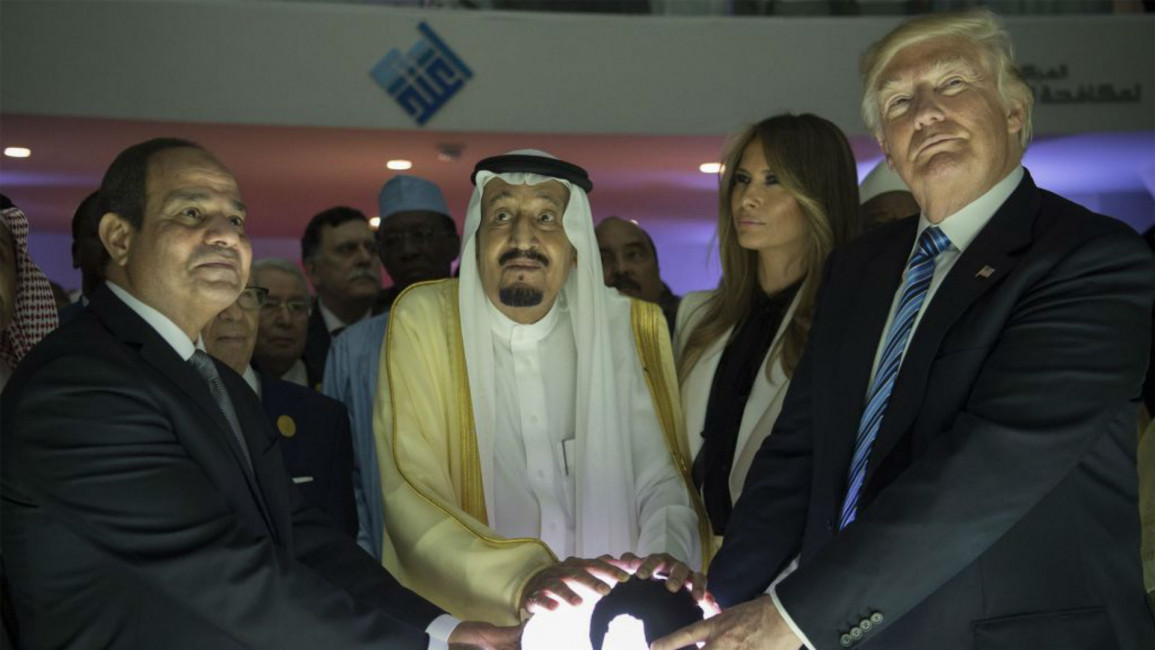Trump is being compared to a Middle East dictator after greenlighting military crackdown on protesters
Trump is being compared to a Middle East dictator after greenlighting military crackdown on protesters
Tear gas, rubber bullets, and attacks on the press: Has the US become an authoritarian state?
3 min read
Trump has called protesters 'domestic terrorists' [Getty]
US President Donald Trump has drawn comparisons with authoritarian leaders from the Middle East after pledging the use of military force to "dominate" anti-racist protesters deemed "domestic terrorists".
Observors have since the beginning of Trump's presidency used playful comparisons between the US leader and international strongmen, such as Turkey's Recep Tayyip Erdogan.
But Monday's backing of military force to restore "law and order" has for some shifted such comparisons from jokes to reality, leaving many asking: Has the United States become a Middle Eastern dictatorship with Trump at its helm?
Trump's Rose Garden address followed the dispersal of protesters gathered outside the White House with tear gas, reportedly to make way for the president's post-speech walk to a nearby church, where he posed with a Bible - a move some contrasted with images of Erdogan and former Iraqi dictator Saddam Hussein holding the Muslim holy book.
"Congrats, America! You have joined the Middle East nations where you cannot peacefully protest outside the presidential palaces," Ragip Soylu, Turkey correspondent for Middle East Eye, wrote in a tweet.
|
|
Rapper and actor Ice Cube added: "The US military that you love so much are about to roll on American citizens today. Welcome to Syria 2020."
Johnny Rashid, an Egyptian pastor who lives in the US, also weighed in: "Trump for a photo op, gassed peaceful protesters. This is what Mubarak and Sisi would do. We immigrated to avoid this s***. Yet here it is."
Protests and riots that have engulfed the US since the killing last week of George Floyd, an unarmed black man from Minnesota who died after being held down by multiple police officers, with one holding his knee on Floyd's neck for nearly nine minutes.
The protests have been met with rubber bullets and tear gas, as well as the arrest of more than 4,000 people nationwide. Video footage distributed on social media has captured police officers attacking peaceful demonstrators and acreddited members of the press.
Such behaviour by a state-funded force in the Middle East would draw stern international condemnation or calls for a UN peacekeeping mission, some have said.
"If America were an oil-rich country in the Middle East or Latin America, Washington would have demanded the president and police respect protesters' human rights, called an emergency meeting of the UN Security Council and demanded regime change," Belgian-Egyptian author Khaled Diab said in a tweet.
Others have compared the labelling of protesters as "outside agitators" and "domestic terrorists" to language levelled against demonstrators during the Egyptian and Syrian revolutions.
Threats to designate ANTIFA - a loose ideology that pledges direct action against fascism - as a terrorist organisation are also familiar to Middle East observers, who have seen dissenting voices labelled Muslim Brotherhood terrorists in Egypt and members of Kurdish and Gulenist terror organisations in Turkey.
Follow us on Facebook, Twitter and Instagram to stay connected



